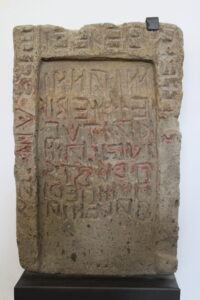 This thesis provides insight into the nature of early Roman imperialism, particularly focusing how elite lineages leveraged (imperial) state resources to further their private agendas. Central to this issue is an inquiry into the empirical foundations of Nicola Terrenato’s Grand Bargain Hypothesis, which posits that early Roman imperialism was an emergent result of inter-elite interactions in central Italy.
This thesis provides insight into the nature of early Roman imperialism, particularly focusing how elite lineages leveraged (imperial) state resources to further their private agendas. Central to this issue is an inquiry into the empirical foundations of Nicola Terrenato’s Grand Bargain Hypothesis, which posits that early Roman imperialism was an emergent result of inter-elite interactions in central Italy.
This inquiry is conducted through a quantitative analysis of all Roman foreign campaigns between 403-293 BCE, visualized at the level of individual elite lineages in ArcGIS heatmaps and supplemented by a thorough qualitative review. The findings show that many elite lineages had coherent geographic spheres of influence, which they created and maintained by leveraging Roman arms. Several family agendas within these spheres are identified and connected to a broader dynamic of elite cooperation, competition, and negotiation in an emerging imperial context. However, an equal number of lineages do not show signs of leveraging Roman state resources to advance private geographic spheres of influence. Existing scholarship suggesting otherwise is shown to be too narrow in scope or based on circular reasoning. The thesis thus concludes that the Grand Bargain Hypothesis is not a complete solution to our lack of a holistic understanding of early Roman imperialism. It is, however, an important new tool in the ancient historian’s repertoire.
